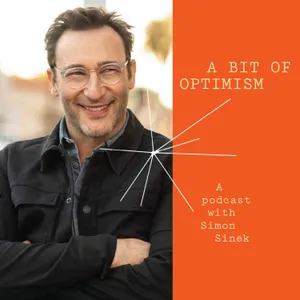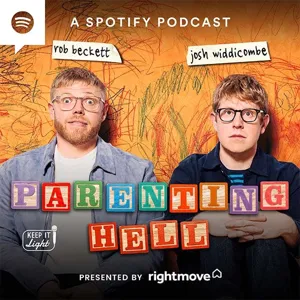Podcast Summary
Reflecting on past beliefs and acknowledging when we're wrong fosters productive disagreement: Productive disagreement requires a willingness to be wrong, reflecting on past beliefs and committing to the possibility of being wrong can help us learn and find common ground
Productive disagreement requires a willingness to be wrong and an openness to learning. Angela Duckworth and Mike Mann discussed this topic on their podcast, "No Stupid Questions," in response to a question from two US governors, Jared Polis (Democrat, Colorado) and Spencer Cox (Republican, Utah). The governors, who are the chairs of the National Governors Association, emphasized the importance of disagreeing productively in today's contentious world. To demonstrate this concept, they suggested an exercise: reflecting on a belief you once held strongly but no longer do. This idea comes from Julia Darr, a managing director at Boston Consulting Group and the global lead of BCG's behavioral economics and behavioral insights initiative. In her TED Talk, Darr emphasized the importance of committing to the possibility of being wrong and finding common ground. This concept, known as "pre commitment" in behavioral science, involves creating a penalty for oneself if one fails to follow through on a commitment. By reflecting on past beliefs and acknowledging when we are wrong, we can foster productive disagreement and learn from each other.
The importance of being open-minded: Being open-minded allows us to reconsider our beliefs, learn from new experiences, and grow. Even when faced with opposing viewpoints, considering alternative perspectives can broaden our understanding and lead to new insights.
Our beliefs and perspectives, even those we hold strongly, may not always be accurate. The speaker shares an example of how she once thought running overnight relays was a foolish idea, but later discovered she enjoyed them immensely. This experience taught her the importance of being open-minded and willing to reconsider her beliefs. The speaker also discusses her research on grit and achievement, and how she initially felt defensive when criticized for her perspective. However, she eventually recognized the value in considering alternative viewpoints, especially those that offer a different perspective on societal structures and opportunities. The conversation highlights the importance of being open to new ideas and perspectives, even when they challenge our deeply held beliefs.
Learning from diverse perspectives broadens understanding: Open communication and healthy disagreements lead to better solutions by embracing diverse perspectives
Open-minded communication and learning from diverse perspectives can broaden our understanding and enhance our work. The speaker shares an experience of collaborating with a sociology PhD student, despite having no background in the field. Through this collaboration, she gained valuable insights by shifting her focus from inside the head to external factors influencing individuals. This example emphasizes the importance of healthy disagreements and learning from each other, as opposed to being defensive or intimidating. In the business world, this concept is referred to as "healthy conflict," where disagreements lead to better solutions. The speaker also highlights the importance of governors encouraging healthy disagreements to find solutions instead of endless bickering. Overall, this conversation underscores the value of embracing diverse perspectives and engaging in open communication to expand our knowledge and improve our work.
The importance of healthy conflict for growth: Learning to disagree productively and maintain open communication fosters innovation and improvement, despite the challenges of encountering opposing views.
Healthy conflict is essential for growth and progress, whether in personal relationships or in business. Conflict is inevitable due to the diversity of perspectives and beliefs. However, it's essential to learn how to disagree productively and maintain open communication. This concept is supported by social psychology research, specifically the theory of naive realism, which highlights how our beliefs can feel like objective truths. Therefore, encountering opposing views can be challenging and frustrating. By fostering an environment where individuals feel comfortable expressing their disagreements respectfully and considering others' perspectives, we can harness the potential for innovation and improvement. As the saying goes, "I'd rather have my neighbor argue with me than agree with my enemy."
Effective communication and disagreement in action: Disagreements can lead to understanding and resolution when individuals communicate effectively and remain open-minded, fostering a cooperative environment for resolving disagreements and finding common ground.
Effective communication and disagreement can lead to understanding and resolution. The classic movie "12 Angry Men" illustrates this concept through a jury trial where one man's persistence in questioning the evidence leads to the unraveling of a wrongful accusation. In real life, disagreements can be civil and even positive when individuals are open-minded and willing to listen to each other. Adversarial collaboration, an idea proposed by psychologist and Nobel laureate Daniel Kahneman, encourages rivals on opposite sides of an issue to work together, committing in advance to accept the outcome based on the evidence. This approach fosters a cooperative environment for resolving disagreements and finding common ground.
Disagreements leading to growth and learning: Productive disagreements can lead to new insights and growth when approached with the right mindset and techniques, such as active listening, staying calm, and focusing on finding a solution.
Productive disagreements are essential for growth and learning, but they require effort and the right approach. As illustrated by the story of the late cognitive psychologist, Marc Hauser, and his wife Anne Treisman, disagreements can lead to adversarial collaborations, where both parties learn from each other and potentially find common ground. However, adversarial collaborations are rare, as people often find it challenging to work with those on the opposing side. To improve the way we disagree, we can look to resources like the self-help book "Conflicted" by Ian Leslie, which emphasizes the importance of productive disagreements in creating something new rather than reinforcing or eradicating differences. The Apple employee's experience also highlights the importance of active listening, staying calm, and focusing on finding a solution rather than winning the argument. In summary, disagreements can lead to valuable insights and growth when approached with the right mindset and techniques.
Start conversations with 'I agree' for effective communication: Emphasizing agreement and acknowledging opposing perspectives can help reduce tension during heated discussions and build a foundation for productive dialogue.
Effective communication, especially during heated discussions, can be improved by emphasizing agreement and acknowledging opposing perspectives. Apple Store employee Adam Grant shares his experience of managing frustrated customers and suggests starting conversations with "I agree," even if it's not entirely true. This simple phrase can help de-escalate tension and make people feel heard. Research from Harvard, Hong Kong University of Science and Technology, and Stanford supports this approach, suggesting the acronym HEAR: Hedge your claims, Emphasize agreement, Acknowledge the opposing perspective, and Reframe to the positive. By focusing on areas of agreement, we can build a foundation for productive dialogue and reduce the likelihood of dehumanizing each other, as suggested by UC Berkeley professor Julia Schroeder. Listening to someone's voice during a controversial discussion can also help humanize the interaction, making us more willing to engage and less likely to dehumanize the other party. In the academic world, where debates often take place through written word, the personal touch of a phone call or in-person conversation can lead to valuable insights and connections that might be missed in a purely digital exchange.
The Power of Human Connection: Human connection can bridge divides and reduce tensions, as shown in the Heineken 'Worlds Apart' commercial. Collaboration and personal interaction can help overcome prejudices and misunderstandings, while leaders can model civility to promote unity.
Human connection, even if it's through a shared experience or a simple interaction, can have a profound impact on reducing tensions and bridging divides. The example given is the Heineken "Worlds Apart" commercial, where strangers with opposing views are brought together to build a bar and eventually sit down to discuss their differences over a beer. This commercial went viral because it showcased the power of collaboration and personal connection in overcoming prejudices and misunderstandings. The research mentioned, such as the one conducted by Stanford University, also highlights the significance of leaders appearing together to model civility and promote unity, even during times of heightened political tension. Overall, the importance of human connection in fostering understanding and reducing conflict cannot be overstated.
Effective communication and understanding between individuals: Watching emotional ads, practicing empathy, signaling uncertainty, acknowledging opposing perspectives, reframing positively, avoiding negative language, and using direct communication can help bridge gaps and foster understanding and collaboration.
Effective communication and understanding between individuals, even those with differing viewpoints, can lead to stronger democratic attitudes and agreements. This was highlighted in a study where watching the emotional Heineken commercial was identified as an effective intervention. The commercial, which shows people coming together despite their differences, is a reminder that genuine dialogue and empathy can help bridge gaps. The study, led by young academic Jan Vogel at Stanford, also emphasized the importance of signaling uncertainty, acknowledging opposing perspectives, reframing things positively, and avoiding negative language. Additionally, the value of direct communication, such as speaking on the phone or in person, was emphasized. It's important to remember that while the process of agreeing to disagree may not be as simple as a beer commercial suggests, it is still a viable and important approach to fostering understanding and collaboration.
History of women's jury rights and adversarial collaboration: New York allowed women on juries in 1937, but the Supreme Court didn't rule on the issue until 1975. Adversarial collaboration, a concept promoting teamwork in conflict resolution, was developed independently by Gary Latham and Miriam Erez in 1988.
The discussion touched upon the history of women's jury rights, with New York being an early adopter in 1937, but the Supreme Court not ruling on the issue until 1975. Additionally, the concept of adversarial collaboration, though popularly associated with Daniel Kahneman, was also developed independently by Gary Latham and Miriam Erez in 1988. Jason, a listener, shared his perspective on the relationship between creativity and happiness, expressing the challenges of balancing the creative urge with financial sustainability. He emphasized the appeal of creative work for control and escapism despite its tedium. The episode concluded with a preview of the next topic, "Are we more lonely these days or just more alone?"





